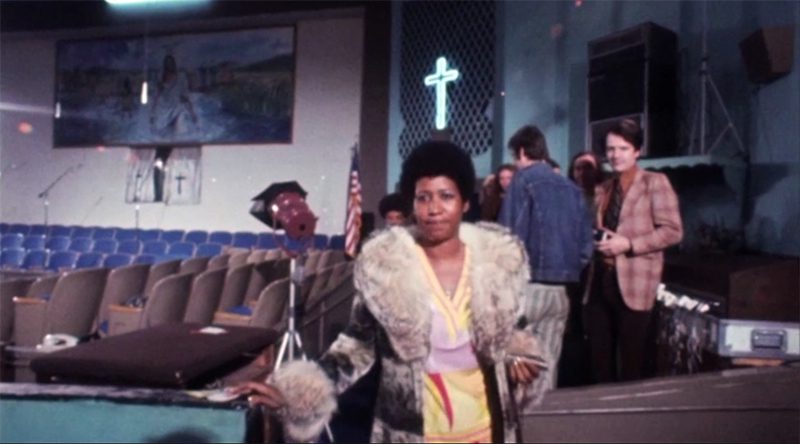Two notable examples of found-footage documentaries crossed the Atlantic in 2019. I've already sung the praises here of Apollo 11, fashioned from the treasure trove of recordings NASA itself made of the 1969 moonshot; Amazing Grace, for its part, bumps us forward three years to 1972, when Aretha Franklin entered L.A.'s New Temple Missionary Baptist Church to record the gospel songs of her youth over a two-day session. She was followed by a documentary crew headed by the director Sydney Pollack, charged with assembling the images and sounds into something that would meet that great post-Woodstock demand for live music docs. Yet a technical issue - a screw-up with the synch sound, doubly calamitous given the rigorous handclapping going on in the pews - meant the footage languished in a vault until Franklin's passing in 2018, whereupon producer Alan Elliott was inspired to go back and take another look at it. Possibly some NASA folk were called in at that point, yet - however it was achieved - a fix was found, allowing transcendent sound and authenticating image to be pieced together into a film that has more or less the same effect as the Apollo doc. This is a film that lifts you up. (You'll be going some if the home viewing experience matches the collective awe some have described taking hold upon watching Amazing Grace in a cinema, though even on my screener copy, the sound was exceptional. You dread to think what Aretha's ghost might have done to Elliott and co. if it wasn't.)
"Amazing Grace" went on to become the biggest selling gospel album of all time upon its release later in 1972, so Elliott's film has nothing to prove, or really to sell: it's an unusual live-performance movie where the focus of attention isn't specifically there to put on a show, rather to do a job, that of an artist under contract. Aretha makes a low-key entrance in a nondescript smock with a splash of eye shadow, barely addresses the swelling congregation who've turned out to see her - saving her voice for the stratospheric high notes that follow - and takes two or three songs before she seems to warm up to the task she's set for herself. Once she does, though: sheesh. We are gathered here in the presence of God to witness an artist at something like her creative peak doing whatever she wanted and having the monumental talent to back it up. If this heathen onlooker feels obliged to note he still prefers pop Aretha to gospel Aretha, I can imagine it won't just be hardcore fans who get a thrill from hearing the singer stamp her authority on such tried-and-tested standards as the title track and "What a Friend We Have in Jesus". (It's the same heady rush I get from hearing the Aretha version of "What a Fool Believes": a great song, comprehensively restructured and rephrased to accommodate a vocal range the size of the Rocky Mountains.)
There remains some lingering mystery as to why this assignment was turned over to the faintly staid Pollack, who doesn't strike you as either a gospel or a soul man. This latter possibly accounts for the lack of adventurousness in the raw material Elliott has had to work with: after an opening establishing shot that situates the church in the heart of the L.A. freeway system, we hunker down inside the church, the camera coverage limited to the occasional pan over a wide-eyed and swaying congregation (including, on night two, a conspicuous pair of Rolling Stones, showing up to pay homage). Pollack was drawn here, as we are drawn here, for one reason alone - to hear an angel sing - and perhaps we shouldn't be too surprised, then, by the fact he and his crew found themselves rather rooted to the spot once Aretha materialised: they didn't want to miss a thing. A defiant instruction, handed down from on high to all this century's wannabe divas, was preserved in the footage Pollack and Elliott landed upon, and it goes something like this: be this good, and not only can you get away with throwing the odd hissy fit, but people will come back to you forty years later, and do everything within their power to assist you in spreading the Word. The final words we hear Aretha sing in Amazing Grace are "My soul is satisfied", and the smile on her face suggests she wasn't at all faking it. Not a bad couple of days in the office, all told.
Amazing Grace is available on DVD through StudioCanal, and to stream via Amazon Prime.

No comments:
Post a Comment